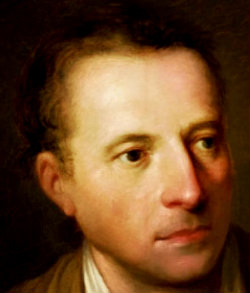Search:: Artists Alphabetically Artists by Country Artists by Century Artists by Movement
Johann Joachim Winckelmann
"The father of Modern Archeology"
1717 - 1768
Cause of Death - murdered, he was strangled.

"As it is confessedly the beauty of man which is to be conceived under one general idea, so I have noticed that those who are observant of beauty only in women, and are moved little or not at all by the beauty of men, seldom have an impartial, vital, inborn instinct for beauty in art.." -- Johann Joachim Winckelmann
The Life and Times of Johann Joachim Winckelmann
Johann Joachim Winckelmann was born at Stendal, in Brandenburg, in the year 1717. The son of a impoverished shoemaker, he endured lots of struggles growing up on the wrong side of the tracks. He often made his own shoes out of cast off garments and pilfered the odd piece of bread. Despite all this he had an amazing intellect and was an avid reader. Hungry for a world outside his grim homelike, Winckelmann devoured Greek classics and was especially fond of Herodotus and Homer.
Upon the urging of his schoolmaster he entered the University of Halle, to study theology. Quickly tiring of tedious religious studies he again turns to studying Greek history, literature and art. The monotony of academic life is occasionally broken up by a stormy love affair with a fellow student. Winckelmann favored effeminate, handsome youths.
In 1743 he became headmaster of a school at Seehausen. This was the most frustrating phase of his life. In spite of a steady paycheck and job security, he found the work of teaching very disappointing.
Wincklemann was drawn to Italy. Attracted by the classical architecture and sculpture, as well as the general acceptance of homosexuality. It was only in this accommodating atmosphere that he felt he could be himself and enjoy a satisfying love life. According to art historian, Walter Pater "That his affinity with Hellenism was not merely intellectual, that the subtler threads of temperament were inwoven in it, is proved by his romantic, fervent friendships with young men. He has known, he says, many young men more beautiful than Guido’s archangel. These friendships, bringing him into contact with the pride of human form, and staining the thoughts with its bloom, perfected his reconciliation to the spirit of Greek sculpture. A letter on taste, addressed from Rome to a young nobleman, Friedrich von Berg, is the record of such a friendship."
Winckelmann lived a full and interesting life in Italy. He enjoyed wickedly passionate, romantic liaisons with attractive Italian young men as well as friendships with artists, archaeologist and scholars. He lived a simple life in a small three room apartment. His meals consisted of cheese, wine, fruit and bread. In 1763, Winckelmann was hired as the Superintendent of Roman Antiquities. Within a few years was awarded the position of Librarian of the Vatican.
Upon returning from Vienna in the year 1768, the brilliant archeologist was killed an Italian rogue. Art historian, Walter Pater describes what happened, "He left Vienna, intending to hasten back to Rome, and at Trieste a delay of a few days occurred. With characteristic openness, Winckelmann had confided his plans to a fellow-traveller, a man named Arcangeli, and had shown him the gold medals received at Vienna. Arcangeli’s avarice was aroused. One morning he entered Winckelmann’s room, under pretence of taking leave. Winckelmann was then writing “memoranda for the future editor of the History of Art,” still seeking the perfection of his great work. Arcangeli begged to see the medals once more. As Winckelmann stooped down to take them from the chest, a cord was thrown round his neck. Some time afterwards, a child with whose companionship Winckelmann had beguiled his delay, knocked at the door, and receiving no answer, gave the alarm. Winckelmann was found dangerously wounded, and died a few hours later, after receiving the last sacraments. "
The murderous rascal, Arcangeli, was later take into custody while playing cards. He was interrogated, tortured, both of his ears cut off and his teeth pulled out. The scoundrel was put to death by being broken on the wheel in front of a crowd of cheering peasants, artists and archeologists.
Color
contributes to beauty, but it is not beauty. Color should have a minor
part in the consideration of beauty, because it is not color but the
structure that constitutes its essence. - Johann Joachim Winckelmann
☼☼☼☼☼
Famous
Quotes About Art
A line is a dot that went for a walk. Paul Klee quote
A beautiful body perishes, but a work of art dies not. Leonardo
da Vinci quote
It is good to love many things, for therein lies the true strength, and
whosoever loves much performs much, and can accomplish much, and what
is done in love is well done.”
Vincent
Van Gogh quote
Creativity
takes courage. Henri
Matisse quote
I
shut my eyes in order to see. Paul
Gauguin
quote
The
painter has the Universe in his mind and hands. Leonardo da
Vinci quote
Art is not what
you see, but what you make others see. Edgar
Degas quote
Absinthe is the
only decent drink that suits an artist. Paul Gauguin
quote
Color is my
daylong obsession, joy, and torment. Claude
Monet quote
Art is either
revolution or plagiarism. Paul Gauguin
quote
I
saw the angel in the marble and carved until I set him free. Michelangelo
Require more facts and information about Johann Joachim Winckelmann? Poke around every nook and cranny of the known universe for information this subject. Search Here
© HistoryofPainters.com If you like this page and wish to share it, you are welcome to link to it, with our thanks.